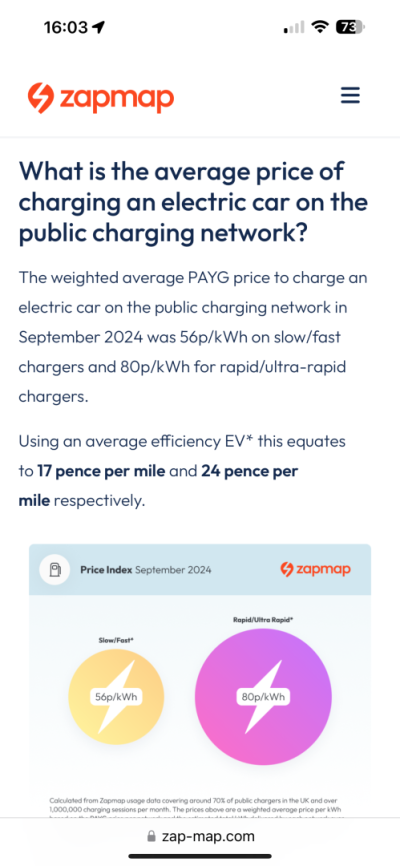56p / kWh is the current UK average cost for under 50 kW chargers, and 80p / kWh is the average for 50 kW plus:
View attachment 162875
Using data from 700,000 charging sessions and the latest PAYG prices, Zapmap calculates the average weighted cost to charge on the public network for both the low powered and high powered rapid and ultra rapid networks.

www.zap-map.com
Under 50 kW is still more expensive than fuelling many (most?) petrol ICE cars.
Did you read the article you linked to?
“What is the average price of charging an electric car on the public charging network?
The weighted average PAYG price to charge an electric car on the public charging network in September 2024 was 56p/kWh on slow/fast chargers and 80p/kWh for rapid/ultra-rapid chargers.
Using an average efficiency EV* this equates to 17 pence per mile and 24 pence per mile respectively
The PAYG price is the price EV drivers can pay at a charge point network without a membership or a special deal.
Some charge point operators will offer time-bound, location specific or partner specific promotional deals, and so for many EV drivers the actual amount they pay will be lower than the PAYG price. Thus we should expect that the actual average price paid for EV charging is lower than the prices above.“
The membership point is an important one. For example members of BP Pulse receive a 20% discount on rates, and members of Tesla receive a 16% discount. Membership fees
may apply.
The 17p and 24p per mile could be improved significantly with the members discount, reducing it to 13.6p and 19.2p excluding membership fees - many don’t pay, and not linked to mileage.
It could be improved further still because it assumes 3.3 and 3.4 mi/kWh which is quite pessimistic. It would be very easy to improve on that by 20%, making it 10.9p and 15.4p.
Repayment of capital, increased utilisation and increased competition will bring the cost of public charging further, but it’s not quite the $hit show the tabloid headlines portray in reality.






